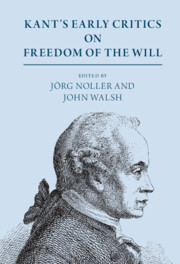Book contents
- Kant’s Early Critics on Freedom of the Will
- Kant’s Early Critics on Freedom of the Will
- Copyright page
- Contents
- Acknowledgements
- Note on the Edition and Translation
- Chronology of the Translated Texts and Kant’s Major Works
- Abbreviations
- Historical and Systematic Introduction
- I Freedom and Determinism
- Hermann Andreas Pistorius, Review of “Elucidations of Professor Kant’s ‘Critique of Pure Reason’ by Joh. Schulze, Royal Prussian Court Chaplain. Königsberg: Dengel, 1784. 8, 254 pages,” 1786
- Johann August Heinrich Ulrich, Eleutheriology or On Freedom and Necessity, Jena, 1788
- Christian Wilhelm Snell, On Determinism and Moral Freedom, Offenbach, 1789
- August Ludwig Christian Heydenreich, On Freedom and Determinism and Their Compatibility, Erlangen, 1793
- II Freedom and Imputability
- III Freedom and Consciousness
- IV Freedom and Skepticism
- V Freedom and Choice
- Appendix: Biographical Sketches
- Glossary
- Notes
- Bibliography
- Index of Persons
- Index of Subjects
Hermann Andreas Pistorius, Review of “Elucidations of Professor Kant’s ‘Critique of Pure Reason’ by Joh. Schulze, Royal Prussian Court Chaplain. Königsberg: Dengel, 1784. 8, 254 pages,” 1786
from I - Freedom and Determinism
Published online by Cambridge University Press: 24 March 2022
- Kant’s Early Critics on Freedom of the Will
- Kant’s Early Critics on Freedom of the Will
- Copyright page
- Contents
- Acknowledgements
- Note on the Edition and Translation
- Chronology of the Translated Texts and Kant’s Major Works
- Abbreviations
- Historical and Systematic Introduction
- I Freedom and Determinism
- Hermann Andreas Pistorius, Review of “Elucidations of Professor Kant’s ‘Critique of Pure Reason’ by Joh. Schulze, Royal Prussian Court Chaplain. Königsberg: Dengel, 1784. 8, 254 pages,” 1786
- Johann August Heinrich Ulrich, Eleutheriology or On Freedom and Necessity, Jena, 1788
- Christian Wilhelm Snell, On Determinism and Moral Freedom, Offenbach, 1789
- August Ludwig Christian Heydenreich, On Freedom and Determinism and Their Compatibility, Erlangen, 1793
- II Freedom and Imputability
- III Freedom and Consciousness
- IV Freedom and Skepticism
- V Freedom and Choice
- Appendix: Biographical Sketches
- Glossary
- Notes
- Bibliography
- Index of Persons
- Index of Subjects
Summary
In his 1786 review of Johann Schultze’s Elucidations of Professor Kant’s ‘Critique of Pure Reason’ (1784), Pistorius criticizes Kant’s concept of transcendental freedom as it is represented in Schultze’s work. Given the expository aim of Schultze’s work and Pistorius’s claim that some of the objections he raises have already been addressed in his review of Kant’s Prolegomena, it is reasonable to presume that Pistorius generally took his criticisms of Schultze to apply equally to Kant. Pistorius observes that Kant’s solution to the Third Antinomy rests on transcendental freedom’s supposed independence from temporal conditions; however, Pistorius maintains, transcendental freedom – qua the capacity to begin a state from itself – presupposes temporal conditions insofar as these conditions are implied by the concept of beginning. Thus, the concept of transcendental freedom is supposedly internally consistent.
- Type
- Chapter
- Information
- Kant's Early Critics on Freedom of the Will , pp. 3 - 8Publisher: Cambridge University PressPrint publication year: 2022



